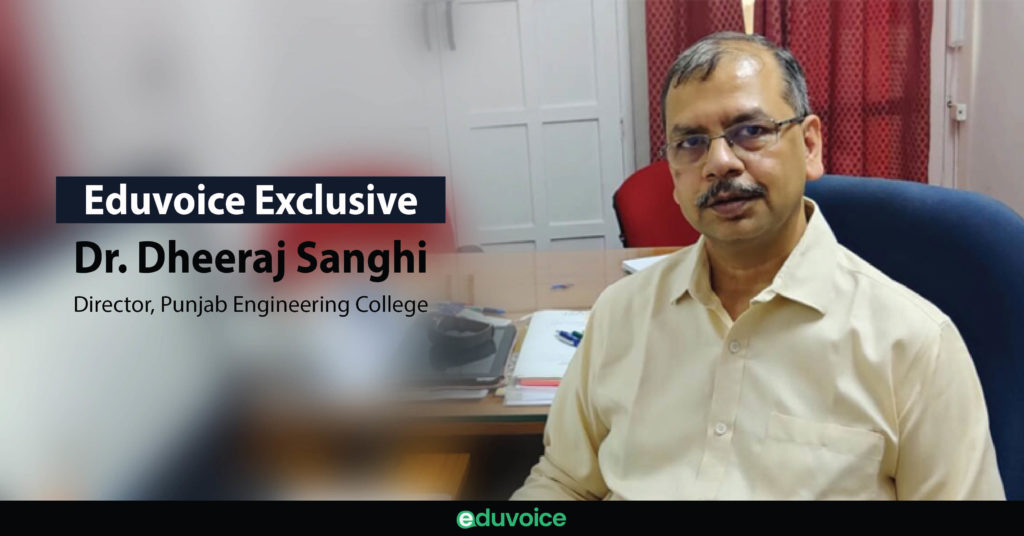Eduvoice exclusive interview

Dr. Dheeraj Sanghi
- Director at Punjab Engineering College Chandigarh
- Held several important roles in different institutions including: Director of LN Mittal Institute of IT, Jaipur, Dean of External Relations at IIIT Delhi, Dean of Academic Affairs at IIT Kanpur
- Researcher in the area of computer networks and network security
“If the student knows what is in the curriculum, then he already knows 80% of the subject because the basics don’t change.”
introduction
In recent times, a lot of institutes have worked towards upgrading their curriculums, but there is a serious underlying issue. The problem we overlook is that we do not learn what already exists in our curriculum.
Another problem is the lack of practical projects in our curriculum. Our educational system is very much inclined to theory exams, instead of assignments and projects.
So to learn more about curriculum development, I had a very informative interview with Dr. Dheeraj Sanghi, who is the Director of Punjab Engineering College. He is very well known for his works in curricular development and has worked with renowned institutions like IIT Kanpur, etc.
Let us dive into this knowledge filled interview.

Sujata Mehta
Every domain has been hit by the pandemic, including the education sector. So how should we design our curriculum to minimize the loss to the students, as we don’t know when this is going to end.
Also, how can we make this situation easier for the faculties so that they can deliver more knowledge to the students?

Dr. Dheeraj Sanghi
My idea about the curriculum has always been that we teach too much. If you look at the engineering curriculum, particularly in tier 3 institutions, the amount of content that they try to teach students is very high. If that is reduced, it will be easier to handle teaching, particularly in emergency situations like the pandemic we are facing.
What happens now is that we have 6 courses every semester. If you had only 4 to 5 courses which is what most top universities have, the teaching load on the faculty will be that much less.
Also, with 6 courses, students spend a lot of time in classrooms and labs, and it becomes difficult for them to carry out projects and assignments. So it becomes a very theoretical and boring education. If the number of courses was less, the faculty can ask students to do more projects, on which they could work from home or hostels.
So I think a reduction in course load is one change that needs to be made.
SUBSCRIBE TO OUR NEWSLETTER
For latest updates on Exclusive Interviews, News, Articles about Higher Education Industry

Sujata Mehta
We are very much at a loss of practical knowledge, which is something we just cannot ignore. Especially in engineering colleges, practical knowledge is very important. So what is your suggestion about it?

Dr. Dheeraj Sanghi
I am of the view that education in the current state is not very practice-oriented. The level of the projects students do is not good enough. Even those poor quality projects are often plagiarised.
But I want to warn you about one thing. When people talk about practical education, the thought immediately goes to taking help from the industry. Students should work on projects which are relevant to the industry. But I believe that seeking industry help is not always the right thing to do. Let me explain with an example.
When some recruiter from the industry comes to me and tells me your students could not write a code in python, we can’t hire them, what does he mean?
Is he suggesting that I should have Python in our curriculum?
No, that’s a wrong interpretation. And, by the way, if he indeed means that the primary reason for not hiring was lack of knowledge of python, then he doesn’t deserve to be the HR manager and he should be thrown out by the company.
According to me what he is saying is that “I am not hiring your students because I am not convinced that they can learn python in a week. If the students could learn python in a week, my company would have no problem. “
What makes him come to this conclusion?
It is because when he comes for placement, he first asks the student what language they have learned. When he finds out that they have learned C++, he asks them to write sample code in C++. And he realizes that the students have a lack of knowledge even in topics that they are supposed to have learned.
So, the problem is that the student had not learned that was a part of their own syllabus. And therefore, they cannot be sure that the student will learn Python in a week. But when it comes to giving feedback, they will blame the lack of Python.
“I am probably the only one in this country saying this, but I don’t want companies in my senate hall when I am deciding my curriculum.”
I see a clear divergence of inputs from an HR manager and a senior technical person from the industry. HR Manager talks in terms of current technologies and immediate needs.
But a senior technical person appreciates basics. He understands that students who can learn things quickly will be great employees. I would want their inputs but they are also very busy, and thus what we get as industry inputs is often the wrong type of input.
There is too much hype regarding industry readiness, but the real issue is that the students are not ready for anything, not even in the subjects they are taught!
“The gap between the industry and academia is overrated.”
Working on technologies that industry is working with is important, but what is much more important is that students do projects and assignments. Just introducing new technologies in the curriculum, and not having projects or allowing cheating in assignments would help no one.
Till the education level is reached to a point that our students are doing several projects, just changing curriculum or introducing the latest technologies will not help. So, in the curriculum design, I wouldn’t mind if the industry is completely absent.

Sujata Mehta
Why do you think we should not incorporate in our curriculum what the industry is demanding?

Dr. Dheeraj Sanghi
Technologies change more quickly than the rate of change of curriculum. Let me explain this with an example,
Say, I am teaching C++ in our curriculum and the industry person comes and suggests me to teach Python instead. A significant change in the curriculum takes 1-2 years, including discussion among the faculty, approvals in Board of Studies, Academic Senate, etc.
Once it is approved at all levels, only then I can implement it from the next batch, and then four years later, the student is going to come out with the knowledge of python.
Thus, six years from now the first batch will be able to graduate with Python. By then Python is going to become irrelevant.
So, as I said earlier, the focus should be to teach the current curriculum so well that the student can learn Python in a week whenever needed. That is more important than a change of curriculum to include Python.
The problem with most Indian university students is that 99% of B.Tech Computer Science graduates cannot write even a 200 line code. Programming is the most basic skill for a CS graduate. We must fix that first, then we can talk about industry involvement.
By talking about industry readiness, we have removed accountability in the system. Today, my teacher is completely off the hook for not teaching properly and my students are completely off the hook for not learning anything.
By bringing in Python, you have ensured that teachers will claim that students are not ready because of the curriculum, and students will also blame the university for not teaching them Python, while the reality is that teachers didn’t teach C++ and students didn’t learn C++.
This is not how we can improve education. The only way to improve it is by holding the teachers accountable and telling them that whatever they are teaching is important.
The curriculum being outdated is a problem, but not a serious one. It is a very small problem, as compared to the fact that the student does not know anything about what is in the curriculum.
“If the student knows what is in the curriculum, then he already knows 80% of the subject because the basics don’t change.”
Nowadays, students don’t know either; new stuff or old stuff, but our focus is only on the fact that he doesn’t know new stuff.
By saying all this, I am not suggesting that we should never upgrade the curriculum. We should try to upgrade it regularly, make it more relevant for the time. But we are ignoring 80-90% of the problem and we are looking at the very tiny 0.1% of the problem called industry readiness.

Sujata Mehta
Another factor you spoke about was that it takes a long time, say 6 years to change the curriculum. Do you think we should work upon how can we reduce its time span?

dr. dheeraj sanghi

Sujata Mehta
If we talk about the faculties, many of them are facing problems taking virtual classes. First, it was a task for them to adopt the system of virtual classrooms. Second, it has put a lot of burden on the professors as compared to their initial work.
How can we work upon this, to make it easier for them and to make the learning more effective?

dr. dheeraj sanghi
I would like to suggest that there should be training for every faculty on how to use new technology. Some differences will arise in the pedagogy when teaching online versus face to face, and the faculty must also be trained for that.
There are many things that can be easily implemented.
AICTE says that a class should not consist of more than 60 students. Thus, to adopt this system, the tier 2 and tier 3 institutes that have batches of about 240 students, distribute it as 4 different faculties teaching 60 students each. This gives rise to a complicated process of making sure that they are teaching similar things to all the students.
However, when teaching online, they can teach all the 240 students in the same video lecture. There is no reason to have four different lectures. And if we can reduce the teaching load in this fashion, the faculty would have enough time to learn new skills and pedagogy.
I think that if the faculty is cooperative, there are a lot of things that can be implemented easily.
For example, there are many good courses available on online platforms such as edX, Coursera, etc. If the teacher is teaching a course on thermodynamics, he/she can handpick this content from the 2-3 websites, and then they can tell the students to go through that content.
After this, the teacher can take one hour of doubt clearing sessions. This is a very effective method of online teaching. The load on the faculty will come down because they won’t have to teach as much, the working hours will be reduced and as a consequence, they will be happier!
I think it all comes down to whether they are willing to help the students and whether they are compassionate towards the students.
The fear in many tier 3 institutes is that this online business is going to result in the firing of staff. That’s one reason why they are slow in the adaptation of these methods.

Sujata Mehta
Exams are a vital part of any learning process. In the current situation what should be done, whether to conduct exams or not? If yes so which is a better mode VIrtual or Offline traditional one?

dr. dheeraj sanghi
As we were planning to end this semester, we had a lot of discussion on exams.
We agreed that all the students are in a state of stress and anxiety. In such a situation, we should be a little bit liberal with them. If we are to conduct exams, we could have a reduced syllabus, a slightly easier exam, and we could be somewhat lenient when it comes to assigning grades.
But, I oppose the idea of giving all of them A grades or being too liberal. A slightly liberal and helping attitude in such a pandemic is ok, but the grades must reflect the learning done by the students to some extent. This is because even 10 years later the student could be showing the mark sheet to someone.
Next, the question arises whether or not it is possible to conduct exams that can be trusted. If we cannot trust the process of the exams, then there is no point in taking the exam. This lack of trust is the reason why I personally am not in favor of taking online exams.
We realized that it is very difficult to trust an online exam. Thus we are only going to trust our evaluation that we did till mid-March and on that basis, we are going to decide whether the students pass or fail.
We also said that this is not a sufficient basis to allot fine-grain grading. Based on the limited evaluation, we cannot determine the exact grades.
Thus, we decided to make the system such that the students either pass or fail. The students that are failing, may argue that they would have passed if they were allowed to give a final exam. For this, we will give them a second chance, by letting them give an exam whenever we can open up the institute.

Sujata Mehta
If this situation extends for 6 months more, how will you proceed with the curriculum for the next semester and the exams for it?

dr. dheeraj sanghi
It is only because this was an emergency that we did not have all the elements in place. Now, we have thought about a mode of action for the future.
Some companies have some very good software for proctoring online exams. We are planning for an online semester and we will make a deal with these companies and use the software that works the best for us. We will conduct online exams next semester.

Sujata Mehta
You must be having some students that stay in the interior parts of the country who must be facing connectivity issues, or they might not even be having laptops or such facilities. How can we plan the virtual mode of teaching with them?

dr. dheeraj sanghi
We are calling such students to stay on our campus. We have 3300 students in total. The government requirements of social distancing, etc. will be such that I cannot have all 3300 on my campus, but I can certainly have 300-400 students on my campus.
Teaching will be completely online, but these students can stay on campus and use our PCs and our internet to attend all the classes.
We can do much more than this for the students.
Let’s say that my student is in Delhi, and there is a student from another university who is in Chandigarh. I can tell the universities of that state to keep my student at their campus and I will allow their student at my campus. This way, we can have collaborations with the universities, to handle students of respective areas.
.
This session with Dr. Sanghi changed my perspective about our thoughts to change curriculums frequently. He gave several insights on the challenges faced during updating of the curriculum.
Also, his thoughts about how we can combat with current COVID-19 pandemic challenges are very innovative, and I’m sure will help many of you.
For More Such Articles, News Update, Events, and Many More Click Here






